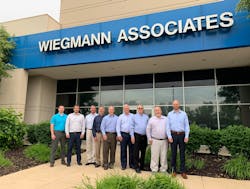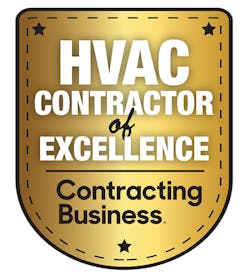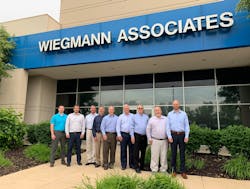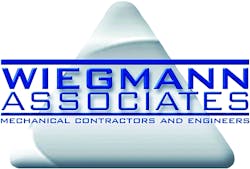Commercial HVAC Contractor of Excellence: Wiegmann Associates
Gerry Wiegmann founded Design/Build mechanical contracting firm Wiegmann Associates in 1995. The St. Louis-based company specializes in innovative, energy-efficient HVAC solutions for its clients. One of Wiegmann’s core areas is commercial office buildings, but the firm also designs and installs HVAC systems for government facilities, residential high-rises, student-living and senior-living facilities, medical office buildings, surgery centers and conditioned/refrigerated warehouses.
“There are many advantages to being a Design/Build contractor, but the main advantage is providing a cost-efficient design,” explains Grant Wiegmann, director of business development and preconstruction at Wiegmann Associates and Gerry Wiegmann’s son. “That means low first costs, low energy costs. You can have 20 engineers look at a senior living facility and come up with 20 different designs. We believe we’ve streamlined the process of minimizing cost while still providing the owner an energy-efficient system.”
Grant Wiegmann: 'We believe we’ve streamlined the process of minimizing cost while still providing the owner an energy-efficient system.'
He adds that less than 50 percent of the overall cost of an HVAC system is the first cost; long-term operating expenses make up the bulk of lifecycle cost. Wiegmann Associates encourages building owners who plan on holding on to their buildings for a while to reconsider installing inexpensive equipment for that reason.
15 Engineers and Adding More
Wiegmann Associates has 15 engineers on staff. The company regularly attends job fairs at Missouri University of Science and Technology as well as the University of Missouri to recruit engineers — mechanical engineers mostly but a few electrical engineers, too. LinkedIn and other networking tools also are used, and the company website has a dedicated careers page for anyone interested in working at Wiegmann.
The leadership team at St. Louis-based Wiegmann Associates (left to right): Todd Jacks, PE, lead engineer; Grant Wiegmann, director of business development and preconstruction; Dave Bosslet, service operations manager; Kevin DeSplinter, PE, senior project manager; Dave Boschert, vice president of field operations; Gerry Wiegmann, PE, chief executive officer; Rick Creed, controls manager; Dan Ebert, CPA, chief financial officer; and Chad Wiegmann, PE, president.
At press time, the union contractor had 107 installers in the field. “Our field guys give us feedback on the most efficient way to size and route ductwork, and on what types of fittings take longer or shorter to install,” he adds.
The company’s culture is one of learning, Grant Wiegmann says; weekly training sessions may include industry experts or vendors, or covered in-house by his brother, Chad Wiegmann, president of Wiegmann Associates.
The HVAC contracting firm works on projects all over the 48 contiguous states — from Washington in the northwest to Florida in the southeast. “I believe the Design/Build talent in other parts of the country isn't as strong as it is in St. Louis,” Wiegmann notes. “It's why we're able to be competitive in other areas of the country. Even in areas where the labor cost might be less, we can still be competitive.”
At press time, the union contractor had 107 installers in the field. “Our field guys give us feedback on the most efficient way to size and route ductwork, and on what types of fittings take longer or shorter to install,” says Grant Wiegmann.
Another advantage Wiegmann Associates has is its dedicated controls department and its direct digital controls (DDC) Delta Controls line. Building automation systems are critical to the HVAC performance of commercial buildings as well as to the building’s utility costs.
“The controls department keeps our costs low because we don’t need to outsource that function to other companies,” Wiegmann notes. “It also allows us to understand how buildings operate — how long systems run, when they shut off, how each system is performing. And it enables us to right-size equipment from the beginning of the project.”
One project showcasing Wiegmann Associates’ problem-solving capabilities was Ameren Corporation’s new 48,000-sq.-ft. corporate office building in Collinsville, Ill. The original design for the mechanical system was expensive and the project was over budget. Wiegmann used the main design — a variable-air-volume rooftop system, fan terminal units for zone control and the same projected energy performance — to reduce the cost of the HVAC system by 18 percent, saving the client $135,000.
Using two Daikin VAV rooftop units and Delta DDC provided a small reduction in costs. “A big part of the savings was due to the duct design,” Wiegmann explains. “It was much more streamlined, so we were able to distribute the air in a much more efficient manner — by minimizing labor hours, the type of sheet metal we used and the installation method of the duct distribution system.”
For Wiegmann, the essential qualities of a successful commercial contractor are a broad base of knowledge in building types, flexibility, response time in meeting constricted construction schedules, a willingness to bid on projects outside a local area and creativity.
The HVAC contractor also uses building information modeling to improve coordination on jobsites. Wiegmann says that BIM and the advanced sequences of the DDC help the company’s field productivity and profitability.
For Wiegmann, the essential qualities of a successful commercial contractor are a broad base of knowledge in building types, flexibility, response time in meeting constricted construction schedules, a willingness to bid on projects outside a local area and creativity.
“Think outside of the box to come up with ideas to help you be cost-competitive and provide the owner other values he might be looking for when it comes to energy operating costs,” he adds. “That is especially important in the design-build world. Sound is a big issue in our industry. Aesthetics is another; the location of the HVAC equipment may have to be hidden so it doesn’t interfere with the look of the architectural design.”
HERE'S NEWS about another of Wiegmann Associates recent projects.
About the Author

Kelly L. Faloon
Freelance Writer/Editor
Kelly L. Faloon is a contributing editor and writer to Contracting Business magazine, Contractor and HPAC Engineering. The former editor of Plumbing & Mechanical magazine, Faloon has more than 20 years experience in the plumbing and heating industry. She started a freelance writing and editing business in 2017, where she has a varied clientele.
Faloon spent 3 1/2 years at Supply House Times before joining the Plumbing & Mechanical staff in 2001. Previously, she spent nearly 10 years at CCH/Wolters Kluwer, a publishing firm specializing in business and tax law, where she wore many hats — proofreader, writer/editor for a daily tax publication, and Internal Revenue Code editor.
A native of Michigan’s northern Lower Peninsula, Faloon is a journalism graduate of Michigan State University. You can reach her at [email protected].



